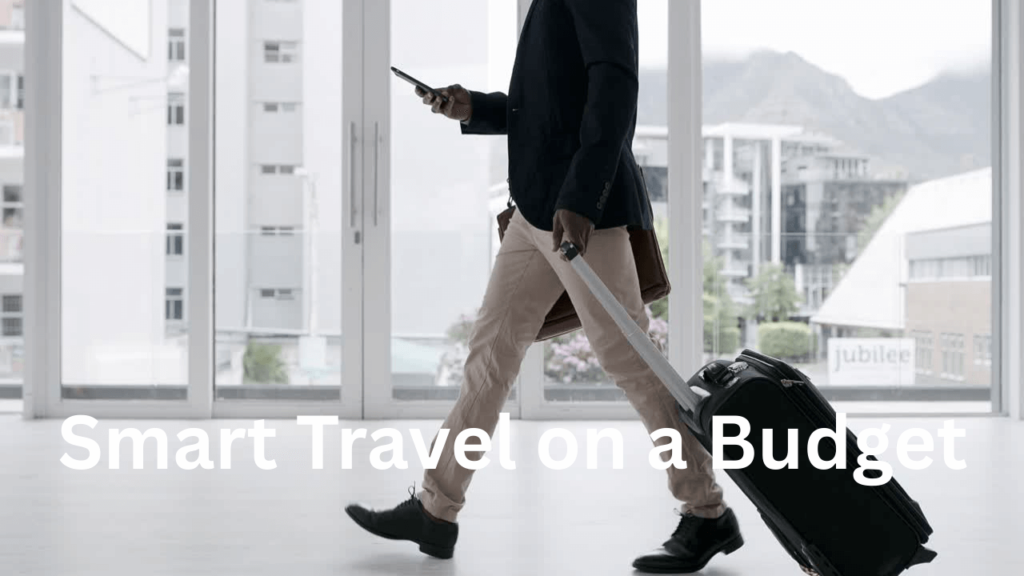Travel has always been a way to experience new cultures, connect with people, and step out of the ordinary routines of life. But in today’s world—where the cost of living is higher than ever—traveling can sometimes feel out of reach. That’s where smart travel on a budget comes into play. With the right mindset, planning, and strategies, you can explore the world without draining your wallet. I’ve personally traveled on a tight budget several times, and I’ve learned that being resourceful not only saves money but also makes the journey more memorable and rewarding.
In this article, I’ll share practical, research-backed, and experience-driven tips to help you travel smarter, spend less, and enjoy more.
Why Smart Budget Travel Matters Today
The rise of inflation, higher fuel prices, and fluctuating currencies have made international and even domestic travel more expensive. But travel remains deeply important—it boosts well-being, enhances global understanding, and creates experiences you can’t put a price tag on. A study from the U.S. Travel Association highlights that travel has measurable benefits on mental health and stress reduction, while research from the World Tourism Organization emphasizes how travel strengthens cultural connections.
Traveling on a budget doesn’t mean sacrificing comfort or experiences—it means making deliberate choices to maximize your resources.
Mindset: How to Approach Budget Travel
Before diving into the “how-to” tips, it’s important to understand the mindset that makes budget travel successful.
- Flexibility is your superpower – Being open to off-peak seasons, less popular destinations, or alternative accommodations will save significant money.
- Prioritize experiences over things – Instead of expensive souvenirs, focus on meaningful local experiences that cost little or nothing.
- Embrace simplicity – Budget travel encourages minimalism. Traveling light not only saves money on baggage fees but also makes moving around easier.
When I first traveled across Europe as a student with little money, I realized that flexibility and resourcefulness were far more valuable than having a luxury hotel booked. Staying in a family-run guesthouse or catching a free walking tour gave me experiences that a higher budget might not have uncovered.
Planning Ahead: The Foundation of Budget Travel
1. Timing Matters
Travel costs vary significantly by season. For example, visiting Ireland in July may cost twice as much as visiting in March or November. Shoulder seasons (spring and autumn) are usually the best balance of lower costs and decent weather.
2. Use Fare Alerts and Tools
Flight prices fluctuate constantly. Setting up fare alerts through apps or airline websites allows you to grab tickets at their lowest point. Being flexible with departure days—such as flying mid-week—can save hundreds.
3. Consider Alternative Airports
Sometimes flying into a smaller airport nearby and then taking a bus or train into the main city is cheaper than a direct flight. For example, when visiting Dublin, I found that flying into Shannon and taking a coach was almost €100 less than a direct Dublin flight.
Transportation Savings
Transportation is one of the biggest travel expenses, but there are smart ways to save:
- Public transportation over taxis – In most cities, buses, trams, or subways are a fraction of the cost of taxis or ride-shares.
- Rail passes – In Europe and Japan, multi-day rail passes offer incredible value if you’re traveling frequently.
- Budget airlines – Low-cost carriers often offer deals as cheap as €20, but always check extra baggage and seat fees.
- Walking and biking – Many cities are walkable or have affordable bike-sharing systems, allowing you to explore while staying active.
A personal tip: I once spent two weeks in Amsterdam and relied almost entirely on cycling. Not only was it cheaper than public transport, but it also gave me a more authentic local experience.
Accommodation: Where to Rest Without Overspending
- Hostels and Guesthouses – These aren’t just for students. Many hostels now offer private rooms at a fraction of hotel costs.
- Short-term rentals – Apartments or shared homes through rental platforms can be more affordable than hotels, especially for longer stays.
- House-sitting and Couchsurfing – House-sitting services allow you to stay in someone’s home for free in exchange for looking after pets or plants. Couchsurfing connects travelers with locals offering free stays.
- Stay outside city centers – Accommodations are often much cheaper a short train ride away from the main tourist areas.
Eating Smart: Saving on Food Without Missing Out
Food is one of the most enjoyable parts of travel, but it can also eat up your budget quickly.
- Eat like a local – Street food, local markets, and neighborhood eateries are often cheaper and more authentic than tourist restaurants.
- Self-catering – Booking accommodations with kitchens lets you prepare simple meals. Even making your own breakfast and coffee saves a lot.
- Lunch specials – Many restaurants offer cheaper set menus at lunchtime. Dine at lunch and snack in the evening instead of having two big meals out.
- Avoid tourist traps – Restaurants right next to famous landmarks usually charge double. Walk a few streets away, and prices drop.
For example, in Barcelona, I skipped restaurants near Las Ramblas and ate at local tapas bars a few streets over. The food was just as delicious—if not better—at half the price.
Activities and Attractions
Free and Low-Cost Options
- Walking tours – Many cities offer free or donation-based walking tours.
- Museums and galleries – Look out for free entry days or discounts. For instance, in London, many major museums are free year-round.
- Nature experiences – Parks, hiking trails, and beaches provide some of the best travel memories at no cost.
Passes and Discounts
City passes often bundle multiple attractions, transportation, and discounts into one price. Always calculate if it’s worth it for your itinerary.
Technology: Tools for Budget Travelers
- Currency conversion apps help track exchange rates.
- Expense trackers keep your budget in check while traveling.
- Local SIM cards or eSIMs often cost less than international roaming.
- Offline maps (like Maps.me or Google Maps offline) save money on data.
Safety and Budget Travel
Budget travel doesn’t mean cutting corners on safety. In fact, being mindful of safety is part of traveling smart.
- Avoid flashing expensive gadgets in public.
- Use lockers in hostels or safes in hotels.
- Research neighborhoods before booking accommodation.
- Have travel insurance—it may feel like an extra cost, but it saves you thousands in case of emergencies.
Real-Life Examples of Smart Budget Travel
During a trip to Ireland, I planned my itinerary around local buses instead of car rentals. I stayed in Cork in a modest guesthouse and joined local walking tours, some of which were free. Not only did I save money, but I also met locals who shared personal stories about the city that I would never have read in guidebooks.
On another trip to Southeast Asia, my biggest expense was flights. Once there, I relied on local transport, ate at street markets, and stayed in family-run hostels. My total two-week budget was less than what some people spend in a week in Europe.
Frequently Asked Questions About Budget Travel
1. Can you really travel comfortably on a budget?
Yes. Comfort depends on planning. Choosing budget-friendly options doesn’t mean roughing it—it means being smart about priorities.
2. How much money should I set aside for a week in Europe?
It varies, but with hostels, public transport, and self-catering, €400–€600 can cover basic needs.
3. Is it safe to book budget accommodations?
Generally, yes—if you read reviews and research neighborhoods. Always choose reputable platforms.
Conclusion: Smart Travel is About Choices
Traveling on a budget is less about how much money you have and more about how you use it. By planning ahead, embracing flexibility, and focusing on authentic experiences, you can see the world without overspending. In fact, budget travel often creates richer, more memorable journeys because it pushes you toward local culture, real interactions, and a sense of adventure.
If you’re considering your next trip, remember: you don’t need to be wealthy to explore the world—you just need to be smart.
What about you? Have you ever taken a trip where saving money actually made the experience better? I’d love to hear your stories and tips.

Hi, I’m Tanvir, the founder and author of Explore Ireland Now. With a deep love for Ireland and its rich culture, history, and landscapes, I created this site to share everything that makes this beautiful country worth exploring. Whether you’re a local looking for hidden gems or a traveler planning your next adventure, I provide insightful guides, tips, and recommendations to help you experience Ireland to the fullest.
From stunning landscapes to vibrant cities and quaint villages, Ireland is full of wonders waiting to be discovered. Through my personal experiences and research, I aim to bring you the most up-to-date information and inspiration for your journey.
Thank you for visiting Explore Ireland Now—I hope my content helps you uncover all that this incredible country has to offer! If you have any questions or need travel advice, feel free to reach out.



